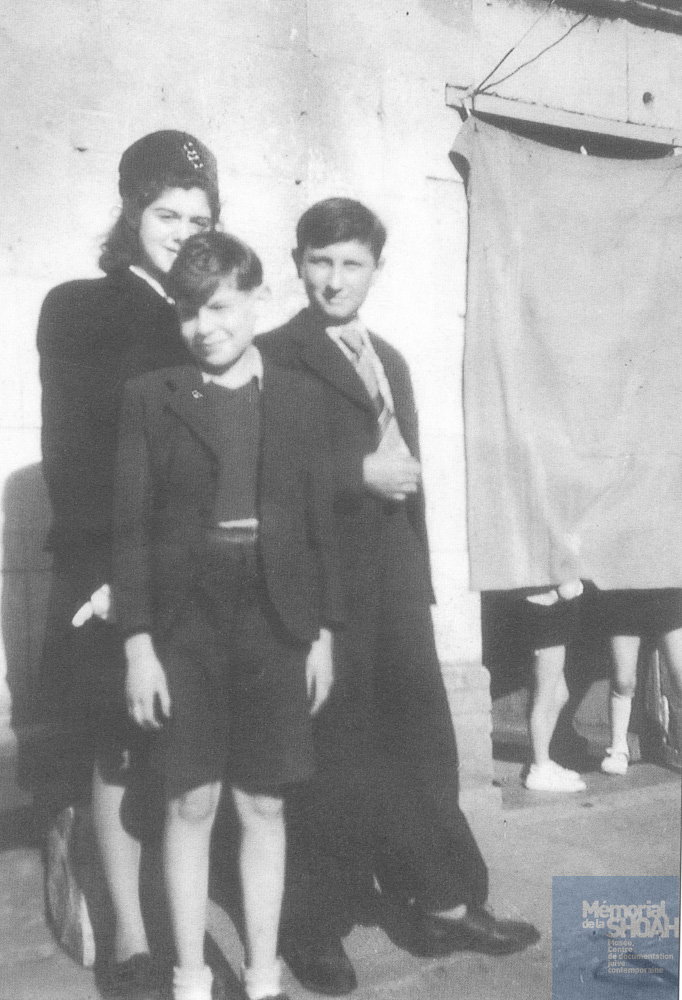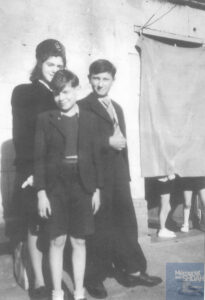Albert ROWEK
Albert Rowek was born in Nancy, in the Meurthe-et-Moselle department of France, on July 15, 1927. He lived with his family at 59, rue Clodion in Nancy, in a working-class neighborhood that was threatened with demolition even as far back as the 1920s. The street is quite different nowadays. His father was Joseph Rowek, who was born in Seidlice (now Siedlce) in Poland on January 14, 1882.
The Seidlice synagogue in the 1920s.
Source: wikipedia.org
When Joseph first came to France, he worked as a locksmith, as he had done previously in Poland. He subsequently became a hosiery salesman on the market in Nancy. His mother, who did not work, was also born in Seidlice on January 25, 1892. Albert was the youngest of five children. He had an older sister called Estelle [1], and two other sisters, Paulette [2] and Fanny, the youngest daughter. He also had an older brother named Paul.
His parents came to France in the 1920s as a result of widespread anti-Semitism in Poland. His cousins, the Rozner family, moved to France at around the same time and for the same reason.
Albert went to the Raugraff school in Nancy. Many other Polish Jews also went to this school. He passed his school-leaving certificate in 1939.
Albert Rowek, on the right of the photo, with his cousins, Hélène and Armand Rozner, during the war.
Photo taken from the Shoah Memorial photo library, and reproduced by the Vienne department branch of the French nonprofit organization, Le Souvenir français [3].
During the Second World War, Albert Rowek lived with his family in Nancy from September 1939 to November 10, 1939. On November 10, 1939, Albert, his mother and his three sisters were evacuated to Libourne in the Gironde department of France. His father, Joseph, followed later. His brother was arrested in 1940. The family was then relocated to Rouillé in the Vienne department. In July 1941, the French Militia arrested Albert, who was then taken to the internment camp on the Limoges road in Poitiers, also in the Vienne department. He was interned there for several months until the Chief Rabbi of Poitiers arranged for him to be released sometime in October or November 1941.
After he was freed, he went to stay with some adult cousins and their children in a chateau about 20 miles from Poitiers. While he was there, the police arrested the adults, leaving him alone with his two young second cousins. The children went to ask for help from some local peasants who took them in and fed them. A priest, Father Fleury, then placed them with a Catholic family, Mr. and Mrs. Gaboriaud, who were already caring for eight children by then. During his stay with them, Albert worked in a florist’s shop, but in 1943 the police arrested him again while he was at work. He was then taken to a USIF (Union des Syndicats d’Ingénieurs français, or French Engineers’ Union) shelter, the Lamarck center in Paris.
Map of the places to which Albert Rowek was deported:
Description of the map:
Albert Rowek began his journey at the Bobigny railway station on July 31, 1944. He was deported to Auschwitz-Birkenau, a concentration camp and killing center in Poland, where he arrived on August 2 or 3, During the selection process, he was deemed fit to work and sent into the concentration camp to undertake forced labor as a carpenter. On January 18, 1945, he was transferred to the Gross-Rosen concentration camp in Germany, near the Polish border. The last concentration camp he passed through was Buchenwald, where he stayed from April 11 to April 23, 1945.
Card showing Albert Rowek’s registration number when he arrived at the Buchenwald camp.
Source: edu.convoi77.org
As the Russian troops were advancing, the concentration camps were evacuated, and Albert set off on the grim death march from Auschwitz-Birkenau to Buchenwald [4].
Albert Rowek survived. On April 28, 1945, he arrived at the Lutetia Hotel in Paris, which was used as a reception center for people returning from the camps. He was cared for there for two weeks, during which time he was fed with vials of glucose solution. He was then sent to a convalescent home in Jouy-en-Josas, in the Yvelines department, to recover fully.
The Gaboriaud family then welcomed him back to their home in Loudun, in the Vienne department. He stayed with them until 1949, when he returned to Nancy and began work in the Malora carpentry workshop in Tomblaine, on the outskirts of the city. However, he was not happy in the woodworking trade and decided to set up a stall on the market. He then went on to work for a number of different local firms. His other interests included boxing and the theater.
As a token of his gratitude, he asked to have his foster family, the Gaboriauds, declared “Righteous Among the Nations”. The State of Israel awards this title to people who helped to protect Jews. Their names were inscribed on the memorials in both Paris and Jerusalem, despite his foster mother’s objections.
Albert Rowek died on December 21, 2017.
An image taken from an interview with Albert Rowek on March 13, 1996.
Watch the video of the interview, in French, on vrid-memorial.com
On May 8, the anniversary of the German surrender, the students taking part in the Convoy 77 project went to the cemetery in the south of Nancy to lay a wreath in memory of Albert Rowek. An article about their visit was subsequently published in the French newspaper “L’Est républicain”.
[1] When she was born, in Poland, Estelle was named Hendla. She later used the French name Estelle.
[2] In the same way as her sister, Paulette was initially named Toba.
[3] https://en.wikipedia.org/wiki/Le_Souvenir_français
[4] Death marches were a means of transporting prisoners in groups, on foot, during which the guards drove the prisoners forward with no regard for their lives, or perhaps even with the intention of killing them.


 Français
Français Polski
Polski












